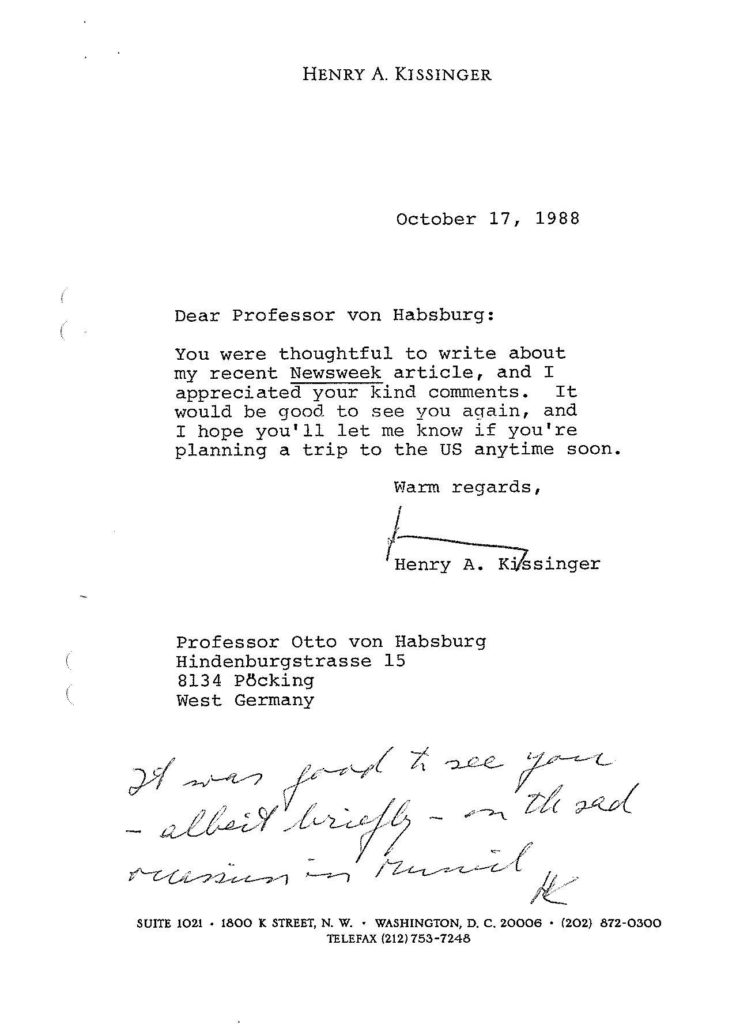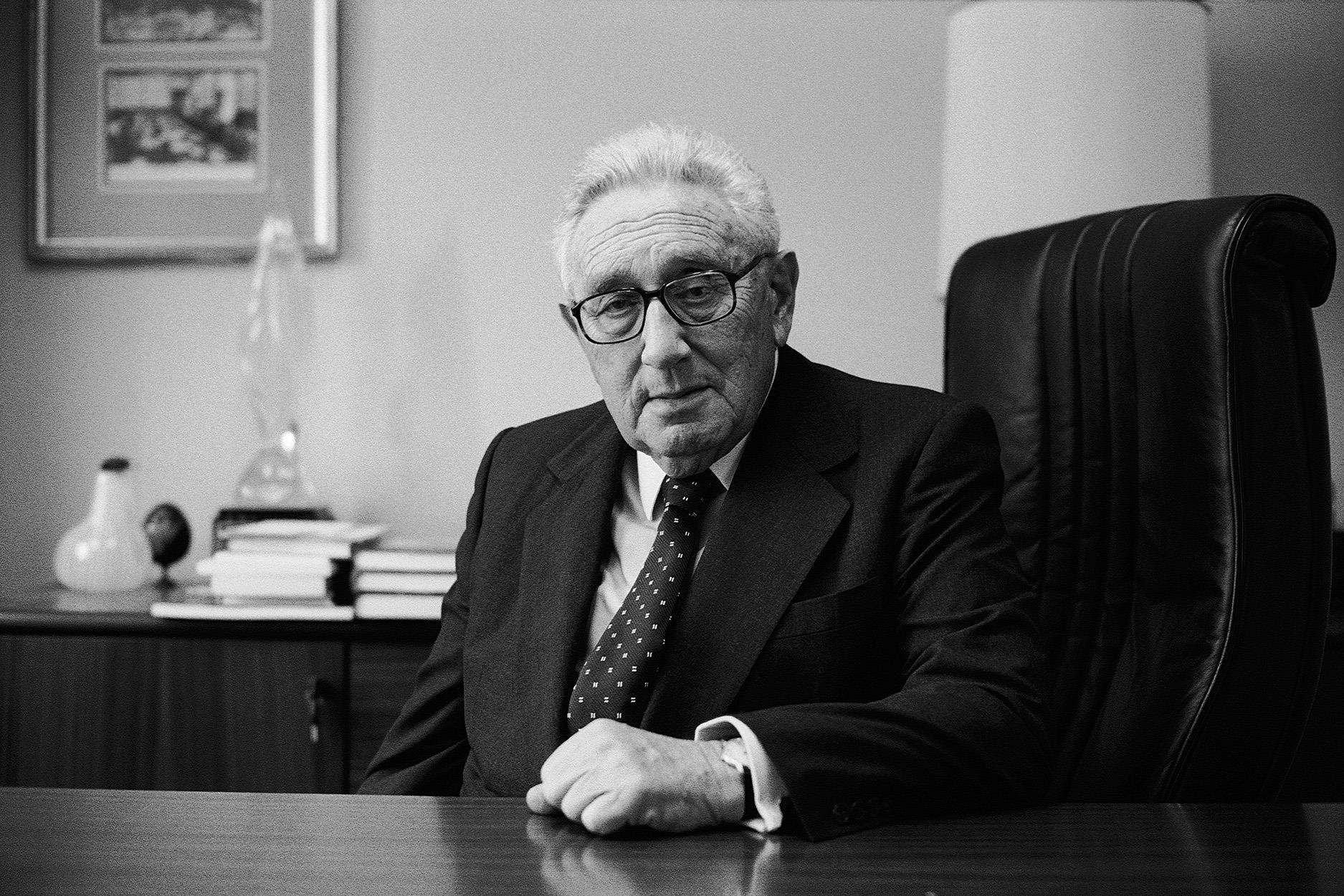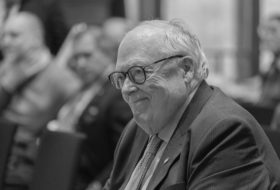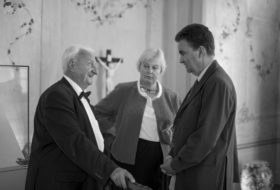Our Foundation’s archives hold the written record of Otto von Habsburg’s more than six decades-long acquaintance with the American politician. In May 2023, we honoured his work with a conference at which we presented his relationship with our namesake in more detail. The following article provides an extracted outline of their many interactions.
”I always make great use of his insights.”
Despite his pragmatism and characteristic realism, Otto von Habsburg’s political beliefs differed in many respects from Kissinger’s; still, the two politicians shared similar views on many critical issues and were happy to discuss the most important matters of world politics despite their potential differences. The former Crown Prince understood that the American diplomat had a keen sense of the transformation processes and movements that could shape the global political architecture for decades to come. At the same time, Kissinger was inspired by Otto von Habsburg’s historical experience and vision.
Henry Kissinger’s reply to Otto von Habsburg’s congratulatory letter, with handwritten lines added on the occasion of their meeting at the funeral of Franz Josef Strauss.
Their correspondence of more than four hundred pages is a captivating record of a kind of thinking that is insightful about the tensions between value- and goal-oriented political actions whilst seeking the possibilities of reconciling both, providing not only a useful source for understanding the nature, dynamics and complexity of the global Cold War and the world order that emerged in its aftermath but potentially a valuable stimulus for contemporary political thought and action as well.
”You are among the few people in public life who not only read history, but also understand it. That is whence your clear vision of the future originates.”
After the Nazi takeover, Kissinger, who fled from Fürth, Germany, retained the European character of his mentality for the rest of his life, and one of the most influential sources of his foreign policy approach is to be found in classical 19th-century European diplomacy. Throughout his career, his thinking and political actions were inspired by the constitutional order of post-Napoleonic Europe and the genius of the figures who shaped it. Through the example of Metternich, he recognised that the balance of influences between the great powers was the sine qua non for maintaining a lasting and stable international order, and he later sought to bear this historical experience in mind as a decision-maker. Although Otto von Habsburg was aware that the balance of power policy in the context of the Cold War was not so much a matter of choice as of necessity, he did not agree with all its manifestations. While he enthusiastically supported the opening up to China, he was vehemently opposed to the efforts at Cold War détente, particularly to the eastern policy of Chancellors Willy Brandt and Helmut Schmidt, who maintained good relations with Kissinger. However, he supported the US politician’s ideas for forming (and, especially, improving) transatlantic relations from the outset.
”…we are proud that he hails from the Old Continent…”
Drawing on the archival sources in our Foundation’s care, it is clear that from the end of the Second World War, Otto von Habsburg assumed a significant role in developing numerous and often overlapping transnational conservative networks. Their primary aim was to repress communism, but their ambition was also to promote European cooperation and, at the same time, to strengthen transatlantic relations. Not much is revealed about the first meeting between the former Crown Prince and Kissinger from the correspondence, though it is likely to have taken place at one of these organisations’ events since the future diplomat, who was still teaching at Harvard at the time, had, peculiarly, several ties to these political groups.
While the Kissingerian policy brought a different quality to European conservative thinking of the sixties, as it was based on a pragmatic and unpretentious approach, the politician’s efforts to defend the common interests of the “West” and to facilitate the necessary cooperation undoubtedly impressed the participants, including Otto von Habsburg. As Secretary of State, Kissinger did not forget his European roots, as evidenced by the Year of Europe initiative he launched precisely 50 years ago. His draft, published in its entirety by The New York Times, reveals that Kissinger knew that the balance between integration and autonomy was the central issue in transatlantic relations and that the main challenge was, therefore, how much unity it wanted and how much diversity it could tolerate.
***
Kissinger’s insights on the evolution and potential of transatlantic relations remain worthy of consideration, and his foreign policy approach, particularly in the light of the Russia-Ukraine war and US and European concerns about China, remains an interesting lesson to be drawn from. At the same time, there have been few more divisive figures in modern diplomacy than the American diplomat. His critics describe him as a cynical Realpolitiker whose decisions led to the deaths of thousands and numerous misuses of power. However, his admirers say he was a practical policymaker who guided the United States through the difficult days of the Cold War while avoiding conflict with China and leading his country into an era of relative peace. Either way – and perhaps it is not too poignant to say this one week after Thanksgiving – he lived a full life, one that he could look back on with gratitude. In his final days, he was also granted the opportunity to write the last essay of his career about his former ‘hero’, Chancellor Metternich.
Bence Kocsev


